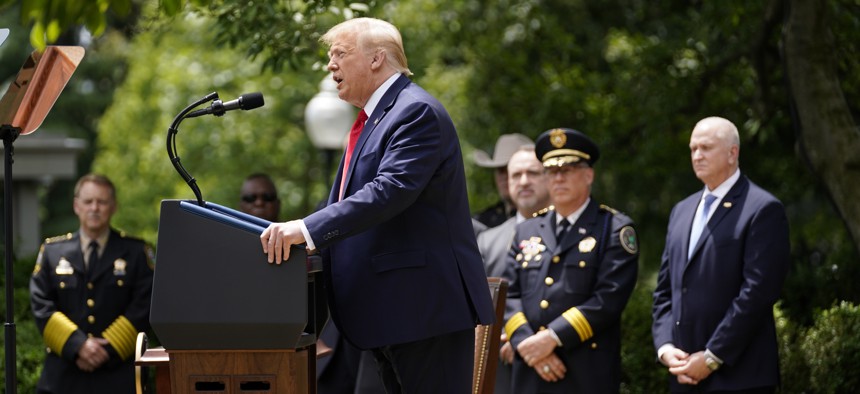Trump Signs Police Reform Executive Order to Encourage More Training, Other Changes

President Donald Trump speaks during an event on police reform, in the Rose Garden of the White House, Tuesday, June 16, 2020, in Washington. AP Photo/Evan Vucci
The order will incentivize police departments to meet use of force training and certification standards, share information about excessive use of force complaints and to dispatch social workers with police on certain calls.
President Trump signed an executive order Tuesday that incentivizes police departments to implement certain reform measures as part of a plan to improve community trust of law enforcement after the death of George Floyd.
The package includes the creation of a national database to track officer misconduct, would channel grant money to departments that meet certification standards involving use of force, and encourages departments to create co-responder programs that would dispatch social workers with police on certain non-violent calls.
The announcement comes as demonstrators have taken to the streets across the country to demand reforms after Floyd’s death, but the measures fall short of calls from Black Lives Matter activists to defund law enforcement and instead allot more money to community services. Across the country, many activists—and some city and state leaders—say they want to see certain responsibilities of the police, like responding to mental health calls, taken away and new specialists created to deal with those problems. In Minneapolis, where Floyd died in police custody, the city council is slowly moving ahead with a plan to dismantle the police department, although leaders say it will take a year to figure out what could take its place.
Trump, who signed the order at the White House while flanked by law enforcement leaders, said the order would promote accountability and transparency and also provide support for police.
“We will have reform without undermining our many great and extremely talented law enforcement officers,” he said.
Trump said only a “tiny number” of officers are responsible for bad acts and denounced calls to defund law enforcement agencies, indicating it would do more harm than good in low-income neighborhoods.
“Without police there is chaos. Without law there is anarchy,” Trump said. “When you remove the police you hurt those who have the least the most.”
Vice President Mike Pence said the White House consulted both law enforcement and leaders in the African American community to come up with the new resources and accountability measures that are included in the order.
“We are not going to defund the police,” Pence told Fox News on Tuesday. “Quite the contrary, we are going to fund new resources to help departments obtain certifications to improve standards for force, improve training on de-escalation.”
With more than 12,000 law enforcement agencies operating across the United States, it is difficult to implement nationwide standards. Renewed scrutiny of use of force by police comes after the death of Floyd, a 46-year-old Black man, who died after a white police officer pinned the man’s neck to the ground using his knee.
House Democrats have already put together a more sweeping proposal, which would establish a National Police Misconduct Registry to track discipline and complaints against officers, seek to ban the use of chokeholds, end officers’ use of no-knock warrants in drug cases, and limit legal protections that often prevent victims of police brutality from pursuing civil litigation. In the Senate, Republicans are also working on a package, which would enact some of the same reforms but excludes any changes to qualified immunity.
Trump’s executive order seeks to incentivize departments to enact training and certification standards by prioritizing grants to departments that do so, said a senior administration official in a background call Monday.
“We’re leveraging our ability to execute discretionary grants and prioritizing those police departments that take the time to get that credentialing,” the official said.
Independent credentialing would aim to ensure officers are trained on how to de-escalate tense situations, as well as on use-of-force standards. Under the order, chokeholds would be banned except in instances when an officer’s life is at risk.
Better tracking of excessive use-of-force complaints would prevent bad cops from moving from department to department, the official said. The “co-responder programs” the White House envisions would partner law enforcement officers with social workers when they respond to non-violent emergency calls that involve mental health, drug addiction, or homelessness.
“We find that law enforcement finds themselves dealing with these issues more often than not,” the official said. “And in many cases, they're not the best one to respond to these type of efforts.”
Andrea Noble is a staff correspondent with Route Fifty.
NEXT STORY: The High Cost of Panic-Moving





